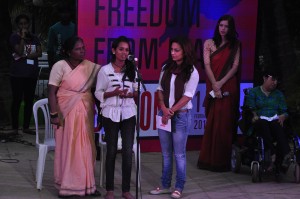An Old Profession Fights For Its Rights
Not all women have the same story to tell. Their experiences are different, and so are their reproductive needs. Join ASAP this Women’s Day, and walk in the shoes of women whose needs have become marginalized.
Today we start with Sex-Workers. Here is a video interview with Michael Babu Raj, Senior Regional Manager of the Karnataka Health Promotion Trust, which works for sex workers’ reproductive rights.
I met Michael at the CEHAT Post-Graduate Course on Health and Human Rights held very recently in Mumbai. He has worked for the rights of sex-workers to affordable Anti-retroviral drugs, effective contraception and safe abortion.
Michael and I had long conversations over tea breaks on the lives of health workers in districts around the Indian city of Bangalore. He has seen several women they work with being arrested on false charges, abused by the clients or by local police officers, beaten by brothel owners and of course stigmatized by the community where they live.
“It is hard for any single woman in India to get a house or to move around without her neighbours suspecting her of some immoral behavior,” he said. “You can imagine what life will be like for a sex-worker.”
While the stigma does not allow them to move about society freely, they do find friends within their own community. “Older sex workers teach young ones about condoms, and sometimes even adopt abandoned girls,” he said. “If you try to take away the sex-work from them, then they will lose this community, and the society will not accept them back either.”
Sex work has been one of the oldest professions in history and yet today sex workers – both male and female – are finding themselves having to fight very hard to get legitimacy for their profession. It is partly because of the stigma that surrounds sex. But in part, it is the health risks like HIV and its accompanying stigma that prevent these communities from living a life of dignity.
“Unless the sex worker recognizes her own job as a profession, she won’t feel like speaking openly about disease or accessing care,” said Michael. “So when we talk of rights, we first need to help them understand that they have rights and that they can ask to be free of abuse.”

This brings me to another story that unraveled in Mumbai on Feb 14, V-day when the city rose with the world to oppose violence against women. At the event held at the Bandra Band Stand, a young 14-year old, the daughter of a sex-worker rose for the rights of her mother. “I have watched my mother being abused – beaten and raped – for a long time,” she said. “But like other women my mother has the right to say no. She need not have sex unless she chooses to.” This young girl is currently writing her board exams and is planning to go to college very soon. How? Because her mother found a profession that could help her educate her daughter.
“When people talk about getting women out of sex trade, they often forget that they’ve already knocked on other doors,” said Michael. “This was the final resort that proved lucrative. It is cruel to take it away from them.”
There are many organizations that work for the rights of sex workers around the world. At Mumbai Rising we ran into Meenu Seshu, who works with Sangram. (http://www.sangram.org/). Sangram has worked actively around India but predominantly in the states of Karnataka and Mumbai to empower sex workers to fight for their rights. They believe, “ People should believe that they can change things. It is not about a few activists fighting for other people’s rights. Anybody who has imbibed this understanding should be able to go and fight for their rights.”
One such right that they are fighting for is the right to safe abortion. When sex-trade itself is stigmatized, it becomes very difficult for the sex worker to access another highly stigmatized form of basic health care – safe abortion.
Unsafe abortion is a big concern in Karnataka, Michael informs me. In the districts where he works, men believe that their pleasure is incomplete if the semen does not touch the vagina. So, even if a sex worker successfully negotiates a condom, some clients tear it with their fingernails before ejaculation.
When sex workers have an unwanted pregnancy, they sometimes have no where to go. “Doctors are not very sensitive to a sex worker wanting abortion. And also some of them think it is illegal,” said Michael. This might actually be true in other countries around Asia, but India has legalized abortion since 1972.
Despite this, he still sees several unsafe abortions around him. “There was a case, when a woman put her hand in and pulled out the fetus,” he said. “She died from hemorrhage.”
I asked him if they had access to abortion pills. “They know about abortion pills in our districts,” Michael said, “but they don’t know what it is called. They can get it over the counter sometimes, if not they just try some unsafe method.”
As we discuss a wide span of vulnerabilities over the week, we will see how marginalized women have worse access than others to health care. But among these women, sex-workers occupy a unique place. They exist because patriarchal societies have exploited women (and some men) for sex historically. But now paternalism is becoming their worst enemy, as conservative heads would rather criminalize sex work and put these women out of a job. This further marginalizes them cutting their access to basic health care and a dignified, healthy life.






